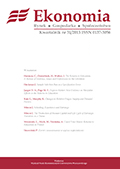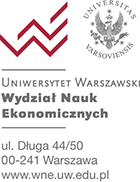Relationship between foreign direct investment stock and foreign portfolio investment stock. Do they really matter for GDP in Poland, Germany, and Great Britain?
J. Kania-Morales, R. Mróz
ABSTRAKT: In this paper we discuss and investigate mutual relationship between FDI and FPI stocks in 3 countries. The standard theoretical economic paradigm sharply differentiates between the two, treating them rather as substitutes from foreign investor’s perspective. Yet, some recent empirical attempts reveal that there are important similarities in their determinants and thus suggest their complementarity. Furthermore, we contribute by assessing FDI & FPI stocks’ impact on real GDPs. In this paper we present estimates of vector error correction (VEC) models’ parameters for three countries, in various settings. We find a number of interesting points – in case of Poland there seem to exist some significant long-run dependences between real GDP and stocks of FDI and FPI, which to some extent stands in opposition to inferences derived from analogical models constructed for two well-developed countries, the United Kingdom and Germany.
Pełny tekst (PDF)
Numer wydania: 38
W numerze:
Social and economic determinants of higher education choices in Poland
T. Gajderowicz, G. Grotkowska, J. Mycielski, L. Wincenciak
ABSTRAKT |
PDF
The aim of this paper is to find determinants of the choice of the field of study made by individuals undertaking higher education in Poland. One the most striking elements of the Polish transition process is a fundamental change of the conditions of the tertiary education market. With growing popularity of higher studies, choices related to this aspect of educational paths of young people gain more and more importance. In this empirical study we apply conditional multinomial logit model in order to find predictors of choices of different study profiles. Unobservable characterises for alternatives, regarding wages and probabilities of employment, were estimated using standard linear regression with Heckman selection procedure. The data used in the analysis come from the Polish General Social Survey for the period 1997-2010. General conclusion from our analysis is that economic factors are insignificant predictors of choice of the type and profile of higher education institution. Instead, social aspects, particularly related to the family background, seem to be key factors driving decisions of those individuals who decided to continue their education beyond secondary level.
Monetary policy and nominal convergence in CEE countries with inflation targeting
Ł. Goczek, D. Mycielska
ABSTRAKT |
PDF
The article discusses the monetary policy in small open economies with inflation targeting and their nominal convergence to the larger monetary area. Using panel data set, the paper considers the relationship between interest rates of interbank markets in the euro area and selected Central European countries – non-euro members of the European Union that follow inflation targeting strategy. We test for panel cointegration and use two estimators: Augmented Mean Group and Random Coefficients. The empirical results show that in the long run the interest rates of non-euro EU countries follow the Eurozone interest rates. What is more important, the AMG model’s common dynamic insignificance suggests that other factors are not relevant to the nature of interest rates transmission.
Public sector wage premium in Poland: can it be explained by structural differences in employment?
G. Grotkowska, L. Wincenciak
ABSTRAKT |
PDF
The public sector is commonly thought to offer relatively low wages, but neither statistics nor research for different countries justifies this belief. In general, the observed regularity is that the average wage in the public sector exceeds the average wage in the private one. The difference is sometimes quite substantial. The comparison of raw average wages suggesting higher wages for public sector would however be misleading. To a large extent, this premium can be attributed to the differences in the structure of employment in both sectors. The public sector employment is biased towards higher level of education and longer job tenures, which on the grounds of human capital theory explains the observed higher average wages in the public sector. The aim of this article is to find to what extent the observed difference in wages is a result of differentiated structure of employment. We use LFS data for Poland and a Mincerean wage regression with Heckman correction supplemented by a quantile regression to show that, after controlling for structural differences in employment, the public sector wage premium in Poland is negative.
Wycena opcji na VIX – podejscie heurystyczne
J. Jabłecki, R. Kokoszczyński, P. Sakowski, R. Ślepaczuk, P. Wójcik
ABSTRAKT |
PDF
W artykule przedstawiamy prostą parametryzację powierzchni zmienności w opcjach, których instrumentem bazowym jest zmienność implikowana z opcji na S&P 500 wyrażona indeksem VIX. W szczególności pokazujemy, że: (i) zmienność implikowana opcji ATM na VIX jest silnie skorelowana z uśmiechem zmienności opcji na S&P 500; (ii) zmienność implikowana ATM opcji na VIX zmniejsza się wykładniczo wraz z terminem wygaśnięcia opcji; (iii) uśmiech zmienności opcji na VIX daje się dobrze opisać za pomocą popularnego modelu zmienności stochastycznej SABR. Wykorzystując proste reguły kciuka opisane w pkt. (i)-(iii) można podać cenę (zmienność implikowaną) opcji na VIX o dowolnym terminie i cenie wykonania, otrzymując wartość zbliżoną do rynkowej.
Relationship between foreign direct investment stock and foreign portfolio investment stock. Do they really matter for GDP in Poland, Germany, and Great Britain?
J. Kania-Morales, R. Mróz
ABSTRAKT |
PDF
In this paper we discuss and investigate mutual relationship between FDI and FPI stocks in 3 countries. The standard theoretical economic paradigm sharply differentiates between the two, treating them rather as substitutes from foreign investor’s perspective. Yet, some recent empirical attempts reveal that there are important similarities in their determinants and thus suggest their complementarity. Furthermore, we contribute by assessing FDI & FPI stocks’ impact on real GDPs. In this paper we present estimates of vector error correction (VEC) models’ parameters for three countries, in various settings. We find a number of interesting points – in case of Poland there seem to exist some significant long-run dependences between real GDP and stocks of FDI and FPI, which to some extent stands in opposition to inferences derived from analogical models constructed for two well-developed countries, the United Kingdom and Germany.
The role of dynamics for trust development. An experimental study
E. Zawojska
ABSTRAKT |
PDF
We report results from a trust game applied in a dynamic setting, which enhances investment possibilities and offers higher potential payoff from cooperation. The proposed approach better reflects the predicaments people face in concluding informal contracts and enables to investigate dynamics of cooperation relationships between players. Although, transferred shares of the disposable endowment do not differ significantly across the standard and modified games, in the absolute values people send more in the dynamic context. Our results suggest that the dynamic setting of the relationship, which has been often ignored in previous studies, might be an important determinant of trust.

